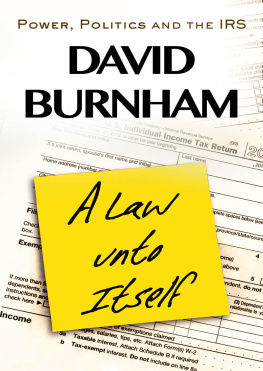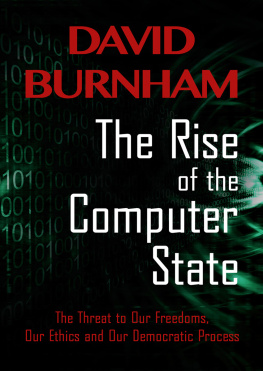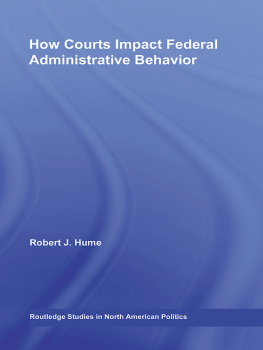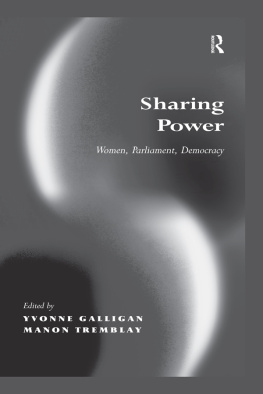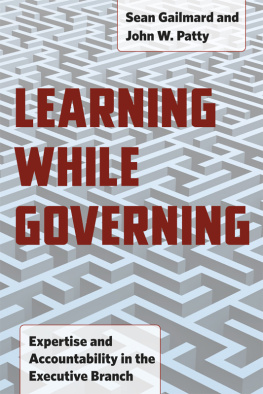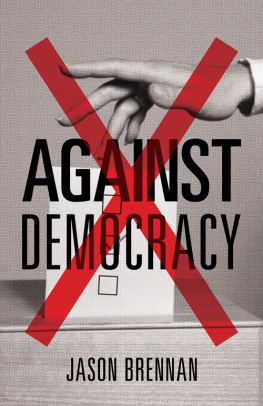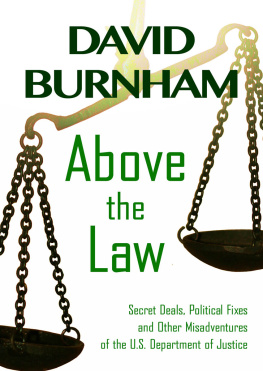A Law Unto Itself
The IRS and the Abuse of Power
David Burnham
C HAPTER 1
Thinking About Taxes and the Taxman
It was Benjamin Franklin, of course, who two hundred years ago told us that nothing was certain in this world except death and taxes.
This worn sample of Franklins elegant knack for stating big truths in simple ways came to mind a while ago as I began reading a stack of government reports on the Internal Revenue Service, nuclear war, and taxes. More specifically, the reports tell how the IRS and its parent agency, the Treasury Department, plan to go on collecting taxes from us after two hundred nuclear bombs have dropped on the United States and killed 100 million Americans, destroyed incalculable amounts of property, and incinerated a substantial part of the records that document the wealth of the nation.
Here, memorialized in the turgid prose of long-forgotten bureaucrats, was stated the absolute first rule of all governments: Nothing, not even the incredible destruction of nuclear war, is more important to any government than the collection of taxes.
Considering the awful mess these federal planners had been asked to resolve, the relentless optimism of their reports is both bizarre and touching. The title chosen by a midlevel Treasury Department technician for his February 1966 analytic report on tax policy in the postattack period tells it all: Fiscal Planning for Chaos. One has to be truly upbeat to develop a tax plan for chaos.
This 1966 study also reflected the perversely self-centered perspective common to all government bureaucrats. In one section, for example, the official indicated that his primary concern about a possible nuclear attack was the disorder that such a strike would bring to government rather than the unimaginable horror it would wreak on society. Because the post-attack period would be one of chaos and disorganization of the revenue service, the official warned, emergency tax proposals for individuals, corporations and bank and nonbank financial institutions should be required to meet two standards. They are (1) revenue yield adequate for defense, short-term emergency needs and rehabilitation, and the quick restoration of services and damaged industrial facilities essential to national survival, and (2) simplicity of administration even to the exclusion of considerations of equity.
The collected doomsday papers of the Treasury Department and its tax collection arm, the IRS, indicate that revenue collection after a nuclear attack remained a nagging concern throughout most of the cold war. A few months after the 1966 report, on the day after Christmas 1967, for example, Treasury Secretary Henry H. Fowler sent a confidential memo to Price Daniel, director of the Office of Emergency Planning. In ironic keeping with the seasonal tradition that it is better to give than to receive, Fowler informed Daniel of the departments current thinking about how the nations taxpayers could go on paying taxes after a catastrophic nuclear attack and some of the working assumptions behind the project.
For emergency planning purposes, the Treasury Department statement began, the estimate is widely used that a nuclear attack on U.S. metropolitan areas could result in 100 million casualties. Property damage would be incalculable in monetary values. That such devastation is considered a serious possibility forces us to the conclusion that no matter what form of tax system is adopted, one basic problem will be simplifying tax administration.
Because Treasury believed it was likely that a nuclear attack would cause different levels of devastation in different parts of the United States, the department concluded that there would be some regions where a tax system would not be necessary and other areas where some kind of formal tax system could be maintained.
In the regions of catastrophic damage, where no tax collection would be feasible, the government would declare martial law and commandeer all available resources to meet emergency needs. In those areas, the government would confiscate all food stores to supply free soup kitchens and order healthy survivors to work in hospitals and other essential facilities. Money payments could be suspended and tax collection could be suspended. Simply stated, everybody would be in the Army.
But after the initial phases of the emergency in even the most hard-hit regions, Treasury predicted that a limited market economy and monetary exchange system would begin to emerge. In this second stage, the Treasury Department concluded, the actual collection of taxes would be required if the government was going to begin acquiring significant amounts of food, medicine, and other supplies by the payment of money. A flat rate gross receipts tax would be simple to administer and fully adequate to economic requirements.
The experts concluded that, as the American people began to rebuild during the post-attack period, problems arising out of wide income differentials would not exist and the refinement of an income tax would not be necessary.
Nevertheless, they continued, it would be desirable to have on the books a personal income tax at the outset of the emergency. The reasons for the very early establishment of a personal income tax even though the private economic sector may have ceased to function, are that (1) the Revenue Service should have time to plan the administration of the tax and (2) liability should be established at the earliest phases of the emergency to tax illegal gains made by speculators and black market operators.
One interesting little Treasury Department paper focused on the problems the IRS would face when it tried to measure wealth after a nuclear attack. Consider a firm whose principal assets consist of a professional football team valued, pre-attack, at $15 million, the study said. Suppose that the players survived the attack and that all the debts of the team were fully paid up. Any plan to levy a net-worth tax post attack must face up to the fact that this firms relative worth in real terms is certainly not going to be the same as pre-attack.
Once they had completed their deliberations, the Treasury Department and the IRS decided the time had come to ask Congress to grant the agency vast standby powers that might be needed should nuclear war actually commence. On October 31, 1977, IRS Commissioner Jerome Kurtz said the basic purpose of the [proposed] legislation is to provide maximum flexibility and decentralization of authority in order that the Internal Revenue Service may effectively carry on operations in areas that have been subjected to an enemy attack.
But even after Congress had approved the emergency powers legislation, the Treasury Department continued to worry about whether or not in the post-attack confusion the IRS would actually be able to collect taxes based on individual income. If there is sufficient damage to the records normally required to document and determine income, it would be necessary to scrap the income tax system as we know it, concluded a 1981 policy paper, Design of an Emergency Tax System.
Instead of an income tax, one could design a general sales tax which would raise the revenue required. Such a tax should be implemented in this situation with as few as possible exemptions from the tax base. This has the dual feature of simple administration and the encouragement of savings to aid in the rebuilding of capital stock since with a consumption base, savings is exempted from the tax.
The 1981 Treasury study concluded that the general sales tax on final sales would have to be approximately 20 percent in order to replace current individual and corporate taxes, social security taxes and estate and gift taxes. (In a subsequent paper, it was decided that the sales tax would have to be upped to 24 percent.)

